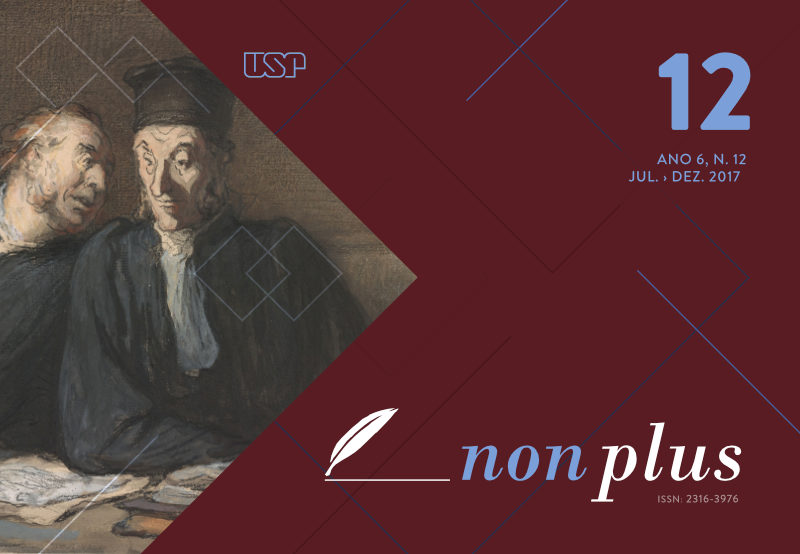Justice in the works by Honoré de Balzac: from the tablets of stone to the sterling tablets
DOI:
https://doi.org/10.11606/issn.2316-3976.v6i12p38-53Palavras-chave:
Contract, Balzac (Honoré de), Law, State, Morals, Civil societyResumo
Among the writers who have become the court clerks for the difficult enforcement of justice, Balzac holds a prominent role — at least within the small-scale society spawned by literature, a microcosm of the macrocosm. Balzac, about whom one could say, without any exaggeration, that he really introduced the judicial world into the literary one, as the former comes to fuel countless plots in his works. Feeling nostalgic for an organic society terminated by the French Revolution, Balzac’s conception of justice dates back to that era and, according to him, the balance tipped, from then on, from the rule of law to a different social order symbolised by the contract, guaranteeing a new social compact — whose shortcomings are extensively scrutinised in The Human Comedy. But does justice reflect the law? Anything but sure, according to the Duke of Chaulieu and the warnings he professes in Letters of Two Brides: “From now on, only penal or financial laws shall rule: your money or your life.” One can only have further doubt when Vautrin, a character outlawed from society, rises to the rank of chief of the civil police force, which the real-life precedent of Eugène François Vidocq cannot entirely account for: beyond the particular case, Balzac hints at a structural change, the very one that goes along with entering the ice-cold waters of civil society.
Downloads
Referências
ARNAUD, André-Jean. Essai d’analyse structurale du Code civil des Français: la règle du jeu dans la paix bourgeoise. Paris, LGDJ, 1973.
BARBÉRIS, Pierre. «préface». In: BALZAC, Honoré. Colonel Chabert. Paris, Gallimard, «Bibliothèque de la Pléiade», III, sans date.
BAVOUX, Jean-Nicolas. Leçons préliminaires sur le Code pénal ou Examen de la législation criminelle, Paris, chez Antoine Bavoux, 1821.
BOUISSOU, Élyane. «Balzac à la Faculté de Droit: Thomassy et Popinot». L’Année Balzacienne, 1972, pp.363-369.
CROUZET, Michel. «Stendhal, la justice et les juges». Cahiers de l’AIEF, 1992, pp.141-176.
DISSAUX, Nicolas (dir.). Balzac romancier du droit. Paris: Lexis Nexis, 2012.
GAUTIER, Théophile. Honoré de Balzac. Paris: Poulet-Malassis et de Broise, 1860.
HUGO, Victor. Les Misérables, I. Paris: Nelson, 1862.
LE YAOUANC, Moïse. «Sur L’Interdiction». L’Année Balzacienne, 1971, pp.253-260.
LICHTLÉ, Michel. «Balzac à l’école du droit». L’Année Balzacienne, 1982, pp.131-150.
LICHTLÉ, Michel. «Balzac et le Code civil». L’Année Balzacienne, 1999, I, pp.119-140.
LICHTLÉ, Michel. «Images balzaciennes de la Justice». L’Année Balzacienne, 2004, pp.261-287.
LICHTLÉ, Michel. Balzac, le texte et la loi. Paris: Presses de l’Université Paris Sorbonne, 2012.
MARQUISET, Jean. Les Gens de justice dans la littérature. Paris: Librairie générale de droit et de jurisprudence, 1967.
MOURIER, Pierre-François. Balzac, l’injustice de la loi. Paris: Éditions Michalon, Coll. «Le bien commun», 1996.
PEYTEL, Adrien. Balzac, juriste romantique. Paris: Ponsot, 1950.
ROUX, Fernand. Balzac jurisconsulte et criminaliste. Paris: Dujarric et cie, 1906.
SAVANT, Jean. La Vie fabuleuse et authentique de Vidocq. Paris: Seuil, 1950.
STENDHAL. Le Rouge et le Noir, chronique du XIXe siècle, II. Bruxelles: Louis Hauman et cie, 1832.
WURMSER, André. La Comédie inhumaine. Paris: Gallimard, «Bibliothèque des idées», 1964.
Downloads
Publicado
Edição
Seção
Licença
Ao enviar o material para publicação, o(s) autor(es) declara(m) automaticamente que o trabalho é de sua(s) autoria(s), assumindo total responsabilidade perante a lei nº 9.610, de 19 de fevereiro de 1998, no caso de plágio ou difamação, obrigando-se a responder pela originalidade do trabalho, inclusive por citações, transcrições, uso de nomes de pessoas e lugares, referências histórias e bibliográficas e tudo o mais que tiver sido incorporado ao seu texto, eximindo, desde já a equipe da Revista Non Plus, bem como os organismos editoriais a ela vinculados. O(s) autor(s) permanece(m) sendo o(s) detentor(es) dos direitos autorais de seu(s) texto(s), mas autoriza(m) a equipe da Revista Non Plusa revisar, editar e publicar o texto, podendo esta sugerir alterações sempre que necessário.
O autor(s) declara(m) que sobre o seu texto não recai ônus de qualquer espécie, assim como a inexistência de contratos editoriais vigentes que impeçam sua publicação na Revista Non Plus, responsabilizando-se por reivindicações futuras e eventuais perdas e danos. Os originais enviados devem ser inéditos e não devem ser submetidos à outra(s) revista(s) durante o processo de avaliação.
Em casos de coautoria com respectivos orientadores e outros, faz-se necessária uma declaração do coautor autorizando a publicação do texto.
Entende-se, portanto, com o ato de submissão de qualquer material à Revista Non Plus, a plena concordância com estes termos e com as Normas para elaboração e submissão de trabalhos. O não cumprimento desses itens ou o não enquadramento às normas editoriais resultará na recusa do material.


